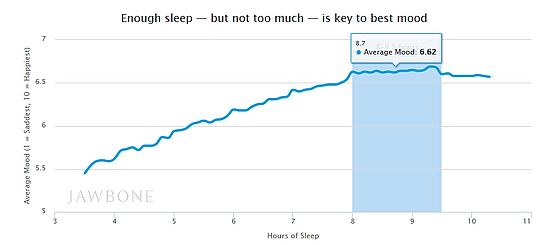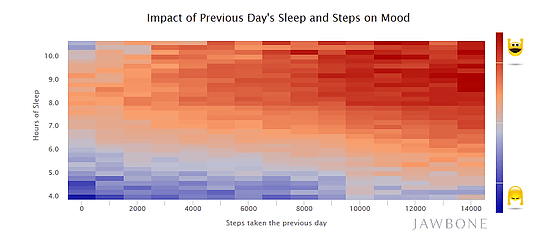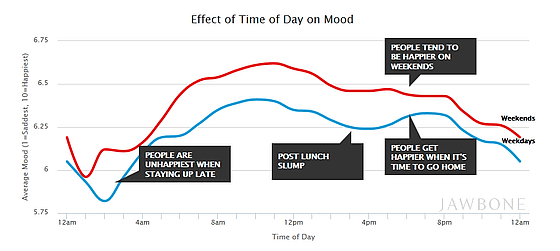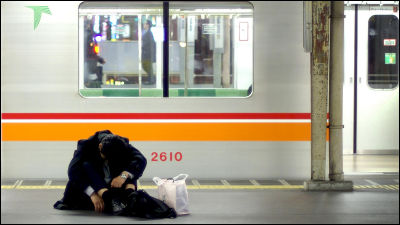'How many hours can I sleep to be happy?' Is revealed by analyzing the life logs of hundreds of thousands of people.

By
Jawbone, which tracks life log data of sleep, exercise, and diet with a wearable device, finds out from the data of its own users that 'the Japanese are the least sleeping in the world ', but 'how much Can we be happy if we sleep? We have data, 'so that the best sleep time, which is neither oversleeping nor undersleeping, is calculated.
What Makes People Happy? | The Jawbone Blog
https://jawbone.com/blog/what-makes-people-happy/
Jawbone strives to improve the overall health of its users by analyzing their lifelog data and publishing it on their blogs.With the UP app provided by Jawbone, you can record the 'feeling' at that time such as 'best!', 'OK', 'no more' in addition to the life log of sleep, exercise, and meal, but Jawbone Analyzing the mood logs collected from hundreds of thousands of UP users over the past year, it became clear how many hours of sleep the users are feeling 'good'.
In the graph below, the vertical axis is 'feeling good', the closer it is to 10, the more happy it is, the closer it is to 1, the worse it is, and the horizontal axis represents sleep time. The mood of the user tends to rise as the sleep time approaches 8 hours, and the average mood of the user who sleeps for 8 hours to 9 hours and 30 minutes is the highest value of '6.6 to 6.9'. After that, even if you sleep for 10 hours or more, your mood value starts to drop, so you can see that the more you sleep, the better.

It can be difficult for some people to get more than eight hours of sleep each day, but according to Jawbone, 'sleeping an hour more than usual has been found to increase happiness by 5%.' That is. In addition, it seems that you can not expect a significant effect even if you sleep more than 2 hours, but it seems that 'when you sleep 2 hours less than usual, people tend to feel twice as unhappy as usual', sleep deprivation You need to be more careful.
Sleep time also correlates with the number of steps, and in the graph below, the vertical axis shows the sleep time of the previous day and the horizontal axis shows the number of steps of the previous day. You can see that the more you walk, the longer you sleep. In other words, if you walk a lot during the day, you will sleep longer, and as a result, you will be able to spend the next day in the best possible condition.

Lifelog data also reveals that there is a big difference in mood between weekdays and weekends, and people seem to feel happier on weekends.
In the graph below, the blue line shows the transition of mood on weekdays and the red line shows the transition of mood on weekends, and the higher you are, the happier you are. People who wake up until 2:00 am on weekdays tend to feel very depressed, but even at the same time on weekends, they have the feeling that 'it's okay to stay up late!' It seems that there are many people who say 'I'm not motivated in the afternoon ...' after lunch, which is the next most depressing feeling on weekdays, but people who feel happy because of the peace of mind that they can go home around 18:00. Tends to increase.

Please note that these data are anonymously statistic and are based on data from hundreds of thousands of UP users over the past year. Jawbone analyzes more than 5.6 million mood logs and more than 80 million days of sleep logs from the collected data, and in order to analyze accurate data, the mood log easily reflects the sleep state of the previous day within 3 hours of waking up It is said that only the data of was extracted.
Related Posts:
in Note, Mobile, Software, Web Service, Hardware, Posted by darkhorse_log






